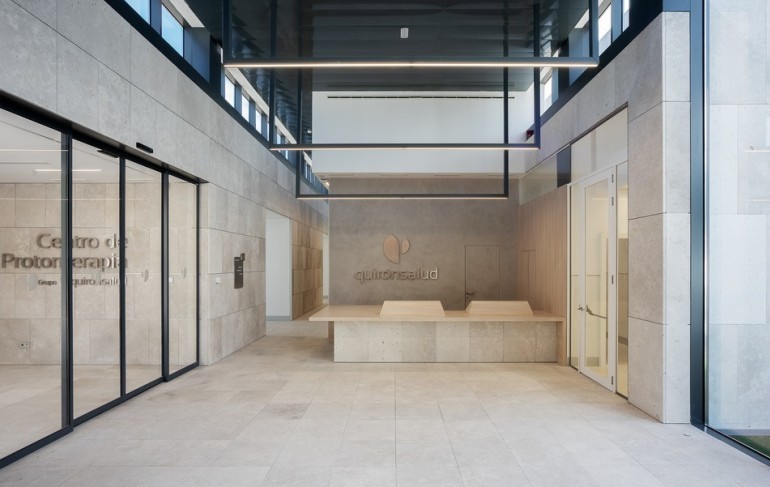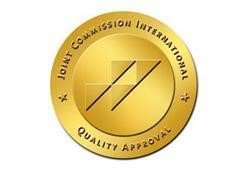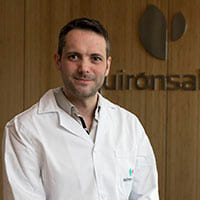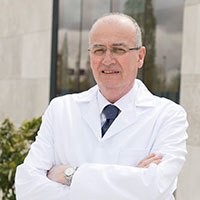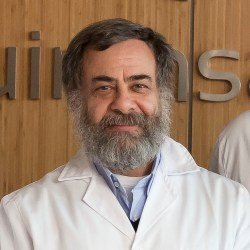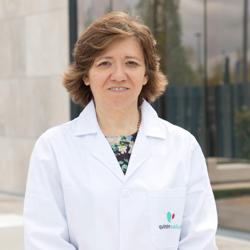Proton therapy center, thank you very much! After reading the patient stories, we were very worried about side-effects of the treatment. Thankfully, the doctors explained us that proton therapy is much safer, which is why it is recommend... Read more
- Medical tourism
- Clinics
- Spain
- Quironsalud Proton Therapy Center
Quironsalud Proton Therapy Center
Madrid, Spain
Clinic Review
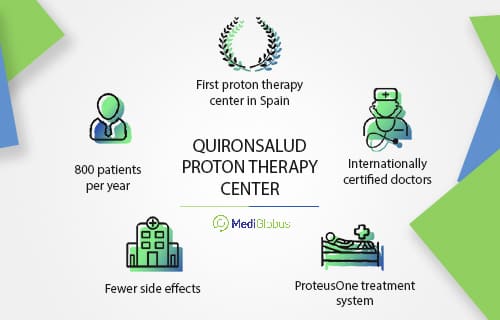
The Quirónsalud Hospitals Group is the largest in Spain. It is made up of 50 hospitals and 90 medical centres. Among the network's 40,000 employees there are internationally renowned doctors such as Dr Rafael Rosel and Dr Jesús Garcia-Fonsillas López. Through close cooperation with research institutes, Quirónsalud Hospitals have earned the reputation of Hospital of Knowledge. The network's clinics are accredited with ISO certificates.
50% of patients treated at Quirónsalud Hospitals are medical tourists.
The Quirónsalud Proton Therapy Center, opened in 2019, is the first in Spain to offer a new way of treating cancer. The main advantage of proton therapy over radiotherapy is that it does less harm to the body and therefore has fewer side effects.
In total, only 27 such institutions have been built in Europe. 200,000 cancer patients have already been treated in these oncology centres.
2-3% of cancer patients are suitable candidates for treatment with proton therapy.
The Centre accepts up to 800 patients per year.
The new Quirónsalud Proton Therapy Center is a modern facility equipped with the most advanced medical technology, where every detail is designed to provide patients with unrivalled comfort. The facility has become a centre for innovation and research that improves the results of treatment and the quality of life of cancer patients.
Hospital stay at the Quirónsalud Proton Therapy Center
The centre occupies 2,000 m2. The area is divided into 4 zones: planning and treatment, support and logistics, medical clinics and doctor's offices.
The staff speaks 15 languages, including English. Also, personal interpreter services are available.
Doctors who treat cancer patients have previously practised in proton therapy centres in the USA, Italy and Switzerland.
Proteus One, the last and most advanced device in the range, is used for treatment. It is much safer than previous generations and is capable of turning around the patient by 220 degrees, irradiating the tumour at different angles. In the future, this system will continue to develop, and rotation therapy and flash therapy will be available at the centre.
In addition to the irradiation device, the proton centre requires a synchrocyclotron, a device that accelerates the protons to the speed required for therapy. The Quirónsalud Proton Therapy Center uses the most energy-efficient and compact accelerator available.
The Quirónsalud Proton Therapy Centre is one of the first in Europe to use GE Healthcare's spectral imaging technology for proton cancer treatment. It also uses high-definition CTs to reduce radiation doses and accurately calculate the therapy plan;
Proton therapy concentrates large amounts of radiation directly in the tumour itself and reduces radiation exposure to healthy tissue around it;
The Quironsalud-GE Healthcare research programme focuses on improving the reliability of calculations in the presence of tissue irregularities. It also aims to improve automatic methods of building anatomical volumes and adaptive treatment methods.
Indications for proton therapy:
Eye, brain and spinal cord tumours;
Tumours adjacent to important organs;
Child cancer;
Secondary irradiation after unsuccessful radiation therapy;
Hereditary cancer;
Absence of serious heart and GIT diseases.
Features of the Clinic
How does proton therapy work?
Proton therapy, like radiation therapy, uses an intense beam of concentrated energy that destroys cancer cells. Unlike radiation therapy, which uses X-rays, here doctors use protons.
The physical properties of protons differ in that the energy acts differently throughout the beam. Most of the radiation takes place inside the tumour and does not go further into the body. By comparison, during conventional radiotherapy, the unit irradiates all tissues in the path of the beam.
The main advantages of proton therapy:
reduces the risk of having second cancer, especially in children;
reduces the number and severity of side effects;
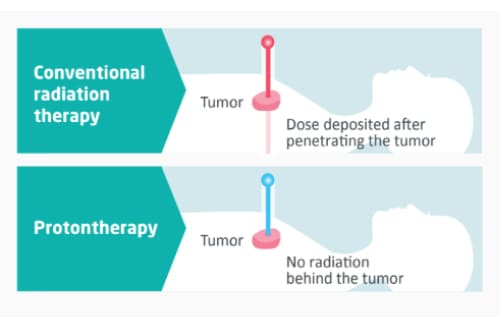
Diagnostics before proton therapy
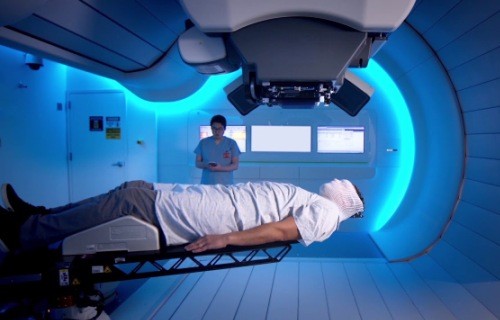
The first stage, which will take place at the Quirónsalud Proton Therapy Center, is preliminary diagnostics. As patients are referred from other clinics, by this time they have undergone all the necessary examinations and are diagnosed. Before the patient arrives in the country, the doctor's board examines all documentation related to the patient - clinical reports, radiological examinations, etc.
Having read the documentation, the board, which includes representatives of various specialities - oncologists, radiologists, paediatricians, etc. - decide whether the patient is a suitable candidate for proton therapy.
The next stage involves consultations with doctors and diagnostics. At these meetings, the specialist will tell the patient in detail about the treatment process and possible side effects, answer all questions and sign the contract. Diagnostic procedures include an MRI and CT scan, and sometimes a PET-CT. They are needed to set up the equipment correctly.
How is proton therapy treated?
Proton therapy is 60% more accurate than radiation therapy, and the tumour receives a higher dose of radiation. As a result, proton therapy affects neighbouring tissues less, produces fewer side effects and is quicker and safer to treat in children and adults. Research by the National Institute of Health confirms that proton therapy improves the quality of life of patients.
The procedure takes 45-60 minutes, with 75% of the time spent adjusting up the device. No hospitalisation is needed for the therapy, and the patient can immediately return to the normal routine.
The equipment installed at the Quirónsalud Proton Therapy Center uses modern technology. Computer systems help doctors adjust the machinery more precisely, including adapting the beam to the patient's body movements during breathing, which improves the accuracy of treatment.
Proton therapy is not burdened by common side effects such as vomiting and hair loss. The complaints that occur among patients are general weakness, redness and flaking of the skin, and dryness or swelling. Compared to the prostatectomy, which is characterised by complications in 28.6% of the patients treated, proton therapy has only 1%.
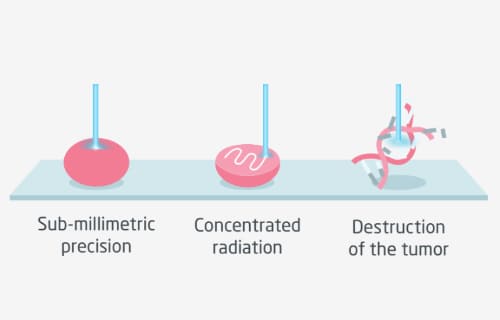
Stages of treatment at Quirónsalud Proton Therapy Center
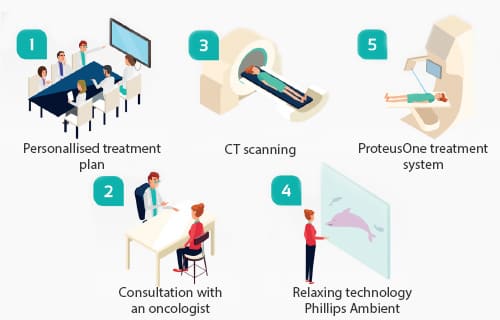
At the first diagnostic meetings, the medical team sets up the equipment and prepares the patient for treatment. Among other things, they make an individual face mask for people with head and neck tumours, which will have to be worn during each irradiation. It fixes the head in the right position.
On average, the patient will need to undergo 20-41 proton therapy sessions. The clinic will need to be visited every day from Monday to Friday, and sometimes even on Saturday. Sessions can be different: for example, on one day, the doctor may irradiate the main cancer site, and on another day, metastases.
Every week, the doctor's board will check the progress of treatment and make necessary adjustments.
At the end of treatment, the patient will receive a detailed report with information about the therapy performed, recommended follow-up examinations and consultations with doctors.
| PROTON THERAPY |
|---|
| Consultations with oncologist, radiologist |
| CT, MRI |
| Control of side effects |
| Individual approach |
Pediatric cancer treatment at Quirónsalud Proton Therapy Center
Pediatric cancer treatment carries several risks that are not typical for adult patients. Proton therapy does not cause side effects such as developmental delay, hormonal deficits or impaired bone growth. Thanks to the discovery of new treatment methods, the survival rate of children with certain types of cancer has increased from 10% to 90%.
Also, the procedure is painless.
Children who are being treated often suffer from increased anxiety. For this purpose, Proteus One has a projector pre-installed in its apparatus that shows soothing videos.
What types of cancer can proton therapy help against?
Proton therapy is effective against certain types of tumours, in particular:
Head and neck cancer;
Brain and eye tumours;
Liver cancer;
Lung cancer;
Breast cancer;
Prostate cancer;
Cancer of bones and soft tissue.
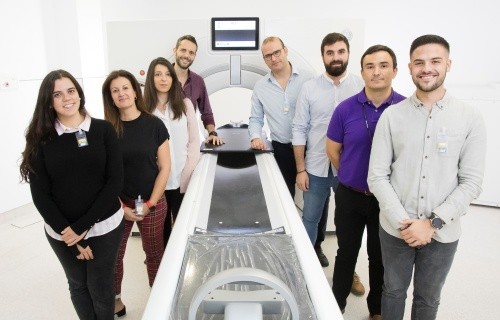
Proton therapy is particularly useful for tumours that require monitoring of high doses of radiation and are located close to the organs sensitive to radiation: the brain stem, optic nerve, spinal cord. This factor is even more important for children, as their organs are still developing and more sensitive to radiation.
The efficiency of proton therapy at Quirónsalud Proton Therapy Center
The effectiveness of proton therapy is similar to or better than radiotherapy, depending on the type of cancer. At the same time, it is much safer.
The five-year survival rate for prostate cancer in the early or middle stages is 99%;
The three-year survival rate for metastasis-free breast cancer is 97.2%;
The three-year survival rate for inoperable lung cancer is 86.5%;
The five-year survival rate for head and neck cancer - 66.8%;
The two-year survival rate for nasopharyngeal cancer - 88.7%;
In non-surgical liver cancer, a complete two-year survival rate of 94.8% is observed.
Cost of treatment at Quirónsalud Proton Therapy Center
Below is an approximate price of proton therapy at the Quirónsalud Center. It takes into account all necessary services (consultations with doctors, supplies, medication, etc.). The exact cost may vary depending on the patient's condition or the need to amend the treatment plan.
| Procedure | Cost |
|---|---|
| Proton therapy (adult patient) | from €60,000 |
| Proton therapy for children without anaesthesia | from €65,000 |
| Proton therapy for children with anaesthesia | from €74,000 |
Certificates
Doctors
The Proton Therapy Center is located near the Quironsalud Hospital Madrid. It is 20 km from Madrid-Barajas Adolfo Suarez Airport and 6 km from the center of Madrid. It takes about an hour to get to the airport by public transport and about half an hour by car. Arroyo Retamares Park and Supercor Expres supermarket are about 200 metres from the hospital.







